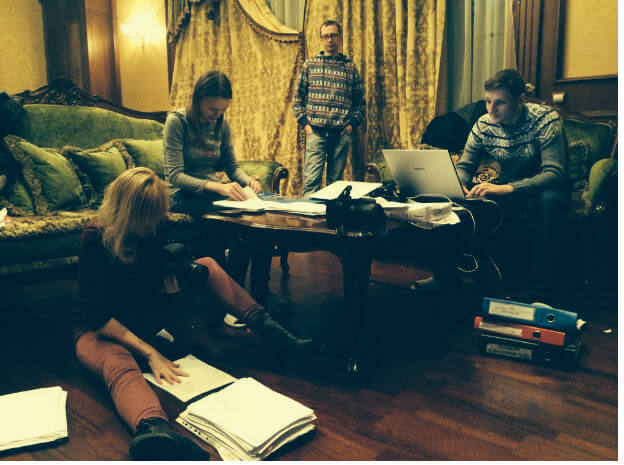
YanukovychLeaks: a game changer for investigative journalism in Ukraine
Documents dumped in a lake and a president on the run. YanukovychLeaks had all the elements of a crowd puller when the story broke in Kyiv in February 2014 and since has widened the space for investigative journalism in Ukraine
By Helle Wahlberg, International Media Support
The Bond-like storyline of thousands of documents found dumped in a lake at the residence of the former Ukrainian President Viktor Yanukovych, as he fled the country, made headlines around the world in February 2014. Over eight days, a team of Ukrainian investigative journalists and volunteers worked relentlessly to salvage the soaked documents which would expose Yanukovych’s billion dollar misuse of public funds for personal gain.
“I was one of the first journalists to arrive at Yanukovych’s abandoned residence and divers informed me that they had found boxes of documents at the bottom of the lake,” explains Anna Babinets, one of the leading journalists in what became known as the YanukovychLeaks investigative team.

“We didn’t know what was in them, but we knew they must be important.”
Anna Babinets had been camped out in Maidan Square streaming live from the Euromaidan demonstrations for the independent, online TV media Hromadske, when she received news of Yanukovych’s abscondence and promptly headed to his abandoned residence on the morning of 22 February. Over the next eight days, she and a team of investigative journalists and 60 volunteers worked around the clock to save the documents, laying out each piece of paper to dry on the floor of a hangar and later in an empty guesthouse. Each document was then sorted, analysed, scanned and published online in a mad rush to share them with the world to pre-empt any interference by the authorities which could jeopardise their work.
Watch the YanukovychLeaks video here.
The investigation, which became known as YanukovychLeaks, provided evidence of Yanukovych and his family’s widespread abuse of public funds for personal gain. The story caused national outrage and was widely publicised in both Ukrainian and international media. While the YanukovychLeaks website is continuously updated with new information, no one has as of yet been arrested or charged. However, the gains for journalism in Ukraine following this high profile journalistic investigation have been both evident and significant, according to several members of the Ukrainian media environment, including Anna Babinets herself.
“The investigation has contributed to changing journalism in Ukraine on several levels, not just in Kyiv but also in the regions of Ukraine,” she says, as she joined colleagues at the 7th Investigative Journalism Conference in Kyiv, Ukraine on 28-29 November.
“Many young journalists have come to realise the importance of paper documents as evidence to back their stories – and not only relying on oral sources. Also, more journalists are now interested in pursuing investigative journalism and uncovering corruption. Under Yanukovych, the system was very closed and investigative journalism was not only difficult, but also dangerous. There was little independent media. Corruption continues to be rife in Ukraine, there is corruption in the court system and so on, but it does not seem to be at the scale of what was exposed with Yanukovych. After the YanukovychLeaks case, we know more and we want to know more. Journalists ask questions and demand answers of the authorities. Asking questions of politicians on this is no longer a problem because we pay them to run the country.”
Anna Babinets continues:
“More broadly, society as such demands better journalism and this is thanks to Ukraine’s strong civil society which was also important for Euromaidan. During the protests in Maidan Square, state media broadcast an interview with President Viktor Yanukovich – not about his plans for the country, but about what Christmas gifts he was planning for his children. Now, people no longer accept this and state-owned media are to some extent more critical, although we still have big problems with media ownership and oligarchs dictating their agendas in media.”
Oleg Khomenok, coordinator of the IMS-supported investigative journalism network SCOOP Ukraine, and who according to Anna Babinets provided crucial journalistic, financial and technical support to the YanukovychLeaks team as they processed the documents and built the case against Yanukovych, agrees that the investigation has influenced the public’s view of journalism.
“In some ways, YanukovychLeaks reinvented investigative journalism in Ukraine and led people to demand more than just the why and the how. People are no longer only interested in answers. They want to know who is responsible.”
Also Dymytro Gnap, a leading journalist in the YanukovychLeaks team and Anna Babinets’ colleague on the investigative journalism TV programme Slidsvo.org, agrees that investigative journalism plays a central role in the evolution of Ukraine.
“Society and government [in Ukraine] will change gradually as corruption is exposed in investigations because the energy of discontent in public accumulates.”
IMS spoke to Anna Babinets and her Ukrainian colleagues at the Seventh Investigative Journalism Conference in Ukraine from 28-29 November. Anna Babinets, 31, produces journalistic investigations for the independent online media Hromadske-owned investigative TV programme Slidstvo.info. The investigations are shown on Ukraine’s national TV broadcaster. In order to test the sustainability of Slidvro.info as a business, the IMS-supported investigative journalism network SCOOP Ukraine financed their first journalistic investigation, which was so successful that it led Anna Babinets and a colleague to set up Slidsvo.info.




